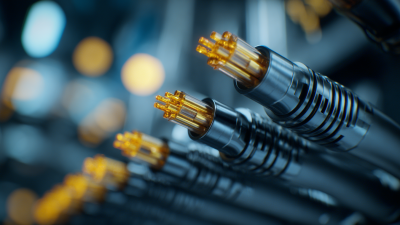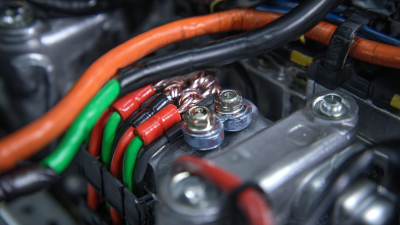In the rapidly evolving electronics industry, manufacturers are constantly seeking ways to enhance efficiency and reduce costs, making PCA assembly innovations essential for gaining a competitive edge. According to a report by MarketsandMarkets, the global market for printed circuit board (PCB) assembly is projected to reach $67.59 billion by 2024, growing at a CAGR of 4.9%. This growth highlights the increasing demand for advanced PCA assembly solutions that not only streamline production processes but also improve product reliability and performance. By harnessing innovative technologies and methodologies in PCA assembly, companies can optimize their operations, minimize errors, and address the complexities involved in modern electronics manufacturing. This blog will explore the latest trends and innovations in PCA assembly, demonstrating how they can unlock significant competitive advantages for businesses in the industry.

The global market for augmented reality (AR) is poised for remarkable growth, with projections indicating an increase from $140.34 billion in 2025 to $171.637 billion by 2032, reflecting a compound annual growth rate of 43.0%. This surge is driven by the increasing adoption of innovative technologies, including low-code and no-code solutions that empower businesses to streamline app development with user-friendly interfaces. Such advancements facilitate rapid deployment and scalability, essential for maintaining a competitive edge in today's dynamic marketplace.
As industries evolve, understanding the strategic significance of critical minerals is vital. These resources are foundational in high-tech and defense sectors, playing a crucial role in national security and energy transitions. Companies focusing on PCA (Printed Circuit Assembly) innovations must integrate these materials into their strategies to enhance operational efficiency and support sustainable practices.
**Tip:** Embrace a collaborative approach in innovation; partner with tech leaders and research institutions to remain at the forefront of industry trends. Additionally, leverage analytics to assess market demands, ensuring that your PCA innovations align with evolving customer preferences and regulatory standards. This strategic focus not only enhances competitive strategies but also positions firms to navigate the complexities of a rapidly changing global landscape.
| Innovation Aspect | Description | Impact on Competitiveness | Implementation Status |
|---|---|---|---|
| Modular Assembly Techniques | Adopting modular components for easier assembly and customization. | Increases production efficiency and reduces time to market. | In Progress |
| Smart Assembly Systems | Using AI and robotics to optimize assembly processes. | Enhances precision and minimizes labor costs. | Complete |
| Sustainable Materials | Incorporating eco-friendly materials in assembly. | Improves brand image and attracts environmentally conscious consumers. | In Progress |
| Data-Driven Insights | Leveraging big data analytics for decision-making in assembly. | Enhances operational efficiency and aligns production with market demand. | Planned |
| Collaboration Tools | Implementing digital collaboration tools for cross-functional teams. | Improves communication and speeds up project timelines. | In Progress |
In today’s fast-paced manufacturing landscape, the incorporation of advanced Printed Circuit Assembly (PCA) techniques is revolutionizing production operations. According to a 2022 report from the IPC (Association Connecting Electronics Industries), manufacturers that implement innovative PCA methods can boost production efficiency by up to 30%. This substantial increase is attributed to the reduction in assembly errors and enhanced automation capabilities. As industries adopt more sophisticated PCA technologies, they not only improve yield rates but also significantly cut down on the time-to-market for electronic products.
Moreover, the economic benefits of advanced PCA assembly are evident. A study by Research and Markets highlighted that investments in PCA innovations yield an ROI of 150% on average over five years, primarily due to lower labor costs and improved throughput. Implementing smart manufacturing practices, such as AI-driven quality control systems and robotic assembly lines, not only optimizes processes but also ensures consistency and reliability in production. As companies increasingly leverage these advancements, they not only stay competitive but also pave the way for sustainable growth in the ever-evolving electronics industry.
In today's rapidly evolving manufacturing landscape, the integration of digital transformation technologies has emerged as a critical driver of efficiency, particularly in PCA (Printed Circuit Assembly) assembly processes. As companies strive to stay ahead of the competition, harnessing advanced digital tools can significantly optimize production workflows, reduce errors, and enhance product quality. By adopting intelligent automation, manufacturers can streamline complex operations, ensuring that resources are utilized effectively and processes are agile enough to meet fast-changing market demands.
Moreover, digital transformation facilitates real-time data analysis and communication across various stages of PCA assembly. This interconnectedness not only helps in identifying potential bottlenecks early but also fosters a culture of continuous improvement through data-driven decision making. With insights gleaned from analytics, teams can quickly adapt strategies, improve inventory management, and minimize downtime. Consequently, the shift towards a digitally transformed PCA assembly not only boosts operational efficiency but also unlocks significant competitive advantages that can define the future success of manufacturing enterprises.
As the technology landscape continues to evolve, the future of PCB (Printed Circuit Board) assembly is set to be shaped by several key trends that promise to redefine efficiency and innovation. One pivotal development is the integration of advanced automation through robotics and AI, which streamlines production processes and minimizes human error. This shift not only enhances precision but also allows manufacturers to scale operations rapidly, responding adeptly to fluctuating market demands and reducing turnaround times.
Moreover, the growing emphasis on sustainability is steering PCA assembly technologies toward greener practices. Manufacturers are increasingly adopting eco-friendly materials and processes, such as lead-free solder and energy-efficient machinery, to lessen their environmental impact. This trend aligns with consumer expectations for responsible production methods while also fulfilling regulatory requirements. As PCA assembly techniques continue to innovate, staying attuned to these technological advancements will be vital for businesses looking to maintain a competitive edge in the ever-evolving electronics market.

PCA assembly innovations have become a pivotal element in driving competitive advantage for businesses across various sectors. Companies such as Apple and Tesla have successfully integrated PCA advancements into their production lines, enhancing efficiency and lowering manufacturing costs. For instance, Apple’s utilization of automated PCA assembly processes has allowed them to streamline component integration, resulting in faster product launches and improved product quality. This case illustrates how embracing PCA innovations can significantly affect a company's market standing.

When considering PCA innovations, companies should first assess their existing production workflows. Identifying bottlenecks can reveal areas where PCA assembly can have the most impact, enabling tailored solutions that maximize efficiency. Additionally, fostering partnerships with tech firms specializing in PCA technology can provide access to cutting-edge tools and knowledge, ensuring companies stay ahead of the curve.
Furthermore, continuous training and development of staff in the latest PCA techniques is crucial. By investing in employee skill enhancement, organizations can maintain a competitive edge and foster a culture of innovation. Empowering teams with the right tools and knowledge allows them to identify opportunities for further improvements and innovations within the PCA assembly process.




Precision Cable Assemblies
16830 Pheasant Drive
Brookfield, WI 53005
Phone: 262-784-7887
Fax: 262-784-0681
